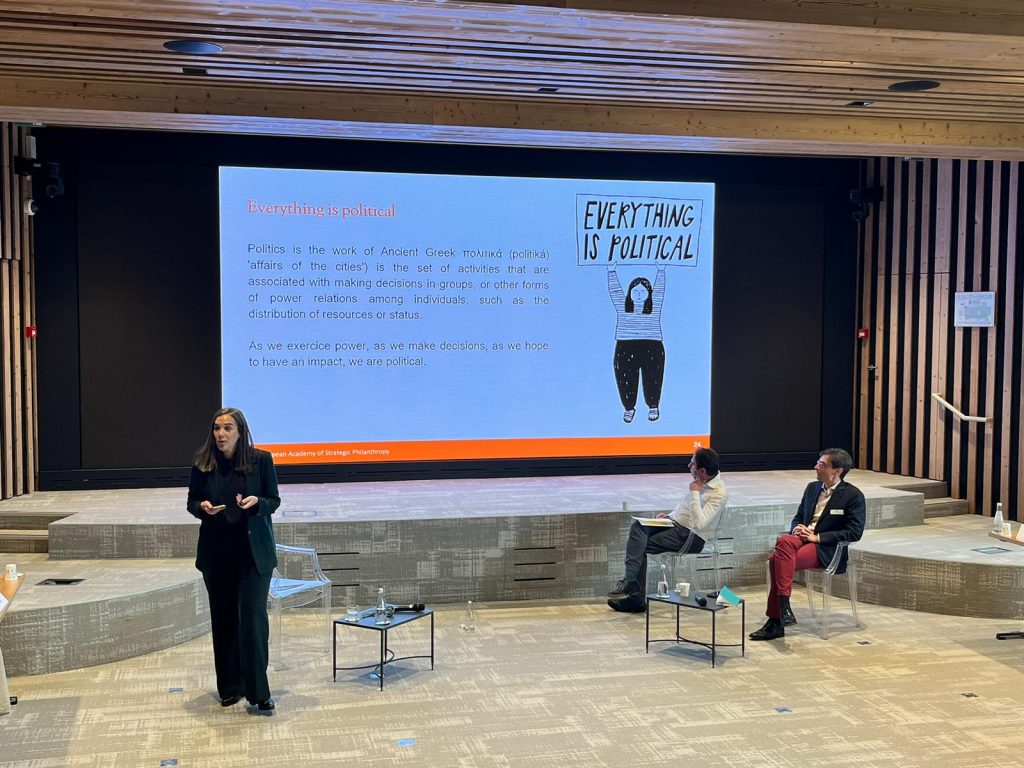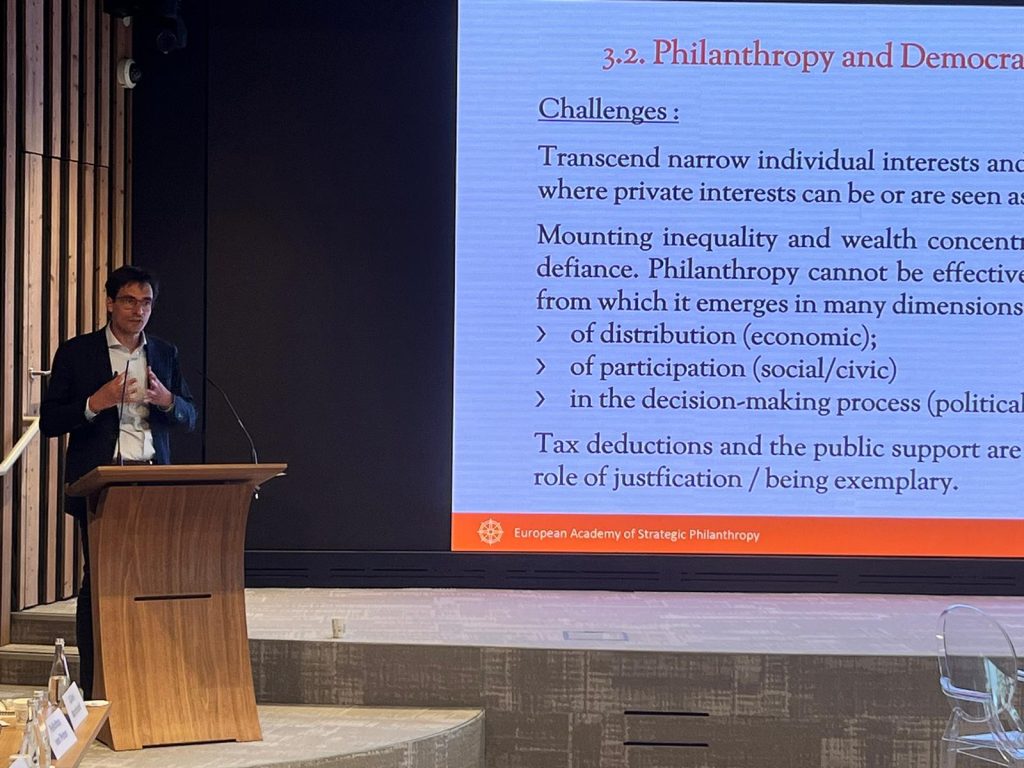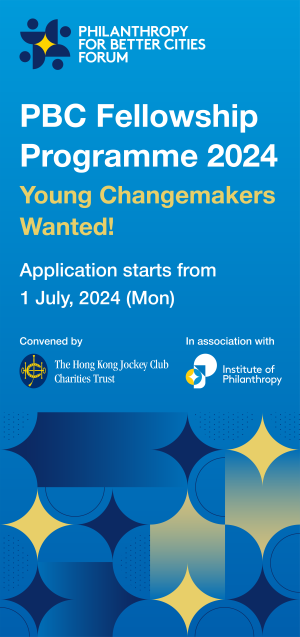This question was put to a tribunal of foundation CEOs during the European Academy of Strategic Philanthropy organised by Fondation de France and the Geneva Centre for Philanthropy at the Centre des Pensières on the shores of Lake Annecy in France. Alliance’s Charles Keidan was in the chair as Multitudes Foundation director, Sarah Durieux and sociologist, Professor Nicolas Duvoux went head to head…

Sarah Durieux
Yes, of course philanthropy is political!
Everything is political. Especially philanthropy. Politics derives from the Ancient Greek πολιτικά (politiká) ‘affairs of the cities’. It is the set of activities that are associated with making decisions in groups and regulating relations within a given social space. Philanthropy is political for three reasons.
First, philanthropy means exercising power. In a context of scarcity, in economic decline and the rise of inequality, philanthropists are exercising power over people with less financial means. Not only that, they do so with public funding. As philanthropists benefit from tax deductions for their endeavours, we can say that they are using power over public resources, as governments would do, making this act a political act. Philanthropists also exercise power by conferring certain social status to individuals or groups by offering public support to their grantees.

Sarah Durieux takes the floor at the philanthropy tribunal. Credit : EASP team
Second, philanthropists are political actors. Philanthropy and philanthropists are not living in a bubble. They both influence and benefit from political choices, for example from political decisions that allow philanthropy to develop. But most importantly, philanthropists are political actors both as organisations and as individuals.
There is no such thing as neutrality
Despite many philanthropists saying they want to remain neutral, they cannot. Neutrality means the absence of opinion or intervention in a given space. Social sciences have proven a long time ago that individuals’ opinions, beliefs and actions are influenced by biases related to their identity: where they grow up, their ethnic or racial identity, their gender, their religious or cultural environment. Where we come from as well as who and what we come across in our lives defines our worldviews. Therefore, individuals in philanthropy have opinions and this influences the way they see the world and make choices. Philanthropic organisations are also political: the mission they define for themselves, the programmes they design, the initiatives they support, none are neutral, all are political choices.
Not engaging in politics while authoritarian and anti-democratic actors are biasing our democratic system and the political debate is being political.
Some argue that being silent or inactive is to remain neutral. But silence and inaction are also statements and political stances. If you come across someone in danger and say or do nothing, you are making a decision. Not engaging in politics while authoritarian and anti-democratic actors are biasing our democratic system and the political debate is being political.
The issue faced by philanthropy is that they confuse being political with being politically partisan. You can do political work without being partisan. For example, in supporting system change on how politics functions, who it includes or excludes, how accessible it is to engage in politics. Being partisan is choosing a side in a battle, while being political is defining a vision of the world we want to help accomplish. By being political, we can stop the polarisation of our societies by setting new standards on how we engage with each other, politically, beyond partisanship. Philanthropy is being partisan when it does not own it is political, as it removes itself from the necessary democratic debate.
Finally, being political is actually having an impact in the world – isn’t that what all philanthropists are pursuing? If philanthropy is about making change, not grants, then philanthropy is political. System change is about changing the way our human-made processes, regulations and beliefs are developed. This is political. When philanthropy helps people build their power to become bearers of change instead of beneficiaries of charitable help, this, too, is political.
Everything exists in a political framework, whether we like it or not, including philanthropy. It is time to be political, be proud and loud about it, as long as it does it openly, and by centring people most affected by the issues.
 Nicolas Duvoux
Nicolas Duvoux
No, philanthropy is not political. Be careful what you wish for…
Philanthropy is not a political activity and precisely because it is not political, it can achieve the most elevated goals of humanity and address the most urgent needs. Precisely because it is not political, philanthropy can pave the way to a stable democratic framework where regulated political disputation can take place.

Nicolas Duvoux presents the case that philanthropy is not political. Credit: EASP team
To understand it, one has to distinguish between two meanings of the word philanthropy. It comes from Aeschylus’ Prometheus Bound. Prometheus embodies a ‘love-of-mankind character’ to protect humans against Zeus. Doing so, he protected the city as a whole, the city in itself, all of its inhabitants. Philanthropy is not political, but it is constitutive of the realm of politics, that is of the activities that take place in the polis.
In our modern understanding, doing politics means fighting for ‘us’ against ‘them’. To the contrary, philanthropy seeks to unite humans by caring for what is common between them, whatever their regime, city of affiliation or faction.
To prove that philanthropy is not political, consider three arguments
First, philanthropy promotes timeless values. It is, by definition, an act of disinterested generosity. Politics is the pursuit of one’s interest, through calculation and deception. Philanthropy is a way to act on the root causes of ills that plague humans wherever they live and whatever they believe in. In the modern era, philanthropy is following the development of knowledge, innovating all the time, addressing emerging issues and anticipating challenges ahead. Otherwise, it is charity, a way to value oneself by moralising about others and once again recurring, in a subtle way, to the us-and-them dichotomy which defies politics.
Philanthropy has the freedom to support individuals and communities even if their ideas are unpopular or unfashionable.
Second, philanthropy backs unpopular causes. It is a buffer against the tyranny of the majority. In an era where mass media, social media and the cultural industry look for profit and produce uniformity and disinformation, philanthropists have supported for decades artistic and cultural initiatives that have redefined the very idea of what a work of art is. Philanthropy has the freedom to support individuals and communities even if their ideas are unpopular or unfashionable. Some ills plague and/or are of too little to attract public attention. Philanthropy can anticipate emerging issues, can be strategic in identifying new needs and find remedies that are not (yet) relevant on the political battlefield.
Lastly, in eras of civic troubles or wars or polarisation, philanthropy can contribute to alleviating tensions and building consensus precisely because it is not political. In an era of political polarisation like ours, philanthropy can help bring people who are opposed in many respects together, making them fight for causes that unify them. Philanthropy is a key solution for our era because it is not political. It is not naïve to refuse to see that philanthropists have and exert power. Philanthropy is a ‘bracketing’ (Einklammerung) of politics: all know it is there but philanthropists consciously refrain from involving themselves in order to secure what is essential.
*The opinions set out above were for debating purposes only and should not be taken to represent the views of the debaters.





Comments (0)
Since it is specified that “The opinions (of the two contributors) are for debating purposes only”, what is the justification for introducing a debate on “ Is philanthropy political ?” besides for having a nice time on the shores of Lake Annecy in France thanks to the philanthropy of some people or organizations that do not care about the answer to that question provided they get in return what they are looking for. This opinion is for debating purposes only and should not be taken to represent the views of the debater...
Possible synonyms for philanthropist (a wealthy person who gives money and time to help make life better for other people): largesse, almsgiving, courteous, donor, donating, pixel speedrun, generous, contributor, giver.